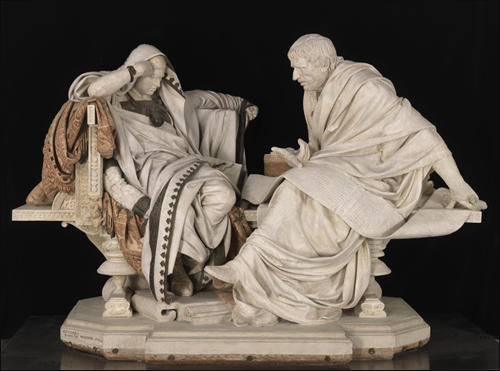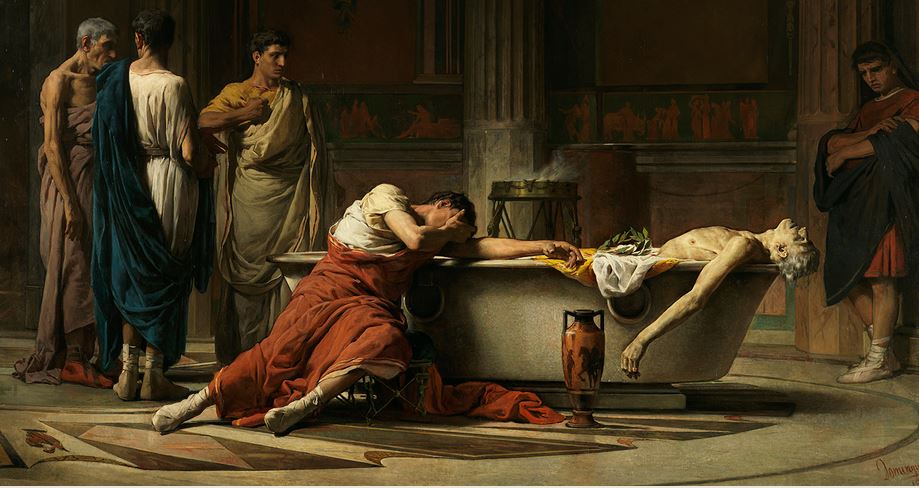Seneca
Practical Insights From The World’s Most Controversial Stoic
Treat This Day As If It Was The Last Day Of Your Life
Seneca - Introduction
Overview
Seneca [or Lucius Annaeus Seneca to give him his full title] lived from 4 BCE to 65 CE and was a stoic philosopher, rhetorician, mentor to an emporer, politician and businessman.
He is highly regarded as a teacher and author of Stoic teachings, wisdom and insights and yet is regarded as a controversial figure of his time for his long association with the infamous emperor Nero to whom he was initially a tutor and mentor when Nero was a boy and then as a Roman senator and eventually as political advisor to Nero when he became emperor.
Seneca The Politician

Seneca experienced the ups and downs of political
life and whilst in service to Nero's predecessor Claudius, and
following allegations of sexual impropriety with Julia Livilla
[Claudius's niece], Seneca was exiled to the island of Corsica for 8
years.
Following his recall to Rome, and on the ascendancy of Nero, Seneca became one of the most powerful and wealthy people in the Roman empire at that time and [temporarily] second only to Nero himself.
Whilst helping Nero he most certainly helped himself and become one of the richest people in the Roman Empire at that time, until he sailed too close to the political wind, was out-manoeuvred by Nero and "invited" to commit suicide.
Seneca's Inconsistencies and Apparent Hypocrisy

Historians have considered and debated the
inconsistencies and apparent hypocrisy between Seneca's Stoic teachings
and ideals and his worldly political and financial success in the service
of one of the most venal and vicious Roman emporers.
In her review "Seneca: A Life by Emily Wilson review – temptation and virtue in imperial Rome" Emily Gowers writes:
Since Miriam Griffin’s Seneca: A Philosopher in Politics (1976), historians have wondered how Seneca could reconcile being a millionaire courtier and Nero’s adviser with his Stoic principles.
"...the more interesting question is why he preached what he did, when he knew his integrity was so compromised..."
She concludes that Seneca's "...urgent, fortifying self-analysis became a literary habit."
and that Seneca "...presents two split halves of himself..."
and "...contorts himself to argue that wealth and virtue are not always incompatible..."
and concludes that Seneca's "...solution was retreat into a world he could more easily control: his own writings."
Modern Stoic apologists such as Massimo Pigliucci have addressed the question and concluded "Seneca Was a Man, Not a Sage"
Seneca The Stoic - Writings

# Epistulae Morales - Letters from a Stoic — A collection of short moral letters addressed to Lucilius and discussing a wide range of philosophical topics, such as grief, wealth, anger, success, failure, and jealousy.
Book Summary, Key Lessons and Best Quotes from "The Daily Stoic"
# De Brevitate Vitae - On the Shortness of Life — This might be the quickest introduction to Seneca, covering a topic many of us feel we understand but don’t: time.
In Seneca on The Shortness of Time Shane Parrish of Farnham Street explains how "...time is one of the most under-appreciated mental models that we all encounter,
and yet it’s the most ubiquitous. When employed correctly, time becomes
an amplifier. When spent without consideration, it becomes a persistent
source of regret."
# De Clementia - On Mercy — A treatise, written to Nero, on blood, happiness, and anger.
Seneca - The Happy Life

A Life Worth Living
Letter 92 of "Letters from A Stoic" is a good summary of the Stoic philosophy and is still a relevant practical guide for living.
Seneca wrote
these letters towards the end of his life, and unlike Marcus Aurielius
who wrote his "Meditations" as an exercise in stoic journaling soley for
his own benefit, clearly with a view to posthumous publication and
establishing his philosophical legacy.
The word "happy" has a deeper and richer meaning in the original Greek word eudaimonia which more literally means "human flourishing" or "blessedness" and can be paraphrased as "a life worth living".
The stoics believed that the practice of virtue [arete - literally meaning excellence] was the route to a life worth living.
Seneca expands on this theme in book twenty "Of A Happy Life" and sets out the following "seven commandments" to himself:

Seneca - Resources
Other Articles On This Site Aligned With Seneca
Supporting Material From Third Party Sources
Stanford Encyclopedia of Philosophy [Stanford University]:
From "The Daily Stoic":
- Who Is Seneca? Inside The Mind of The World's Most Interesting Stoic
- Letters From a Stoic by Seneca: Book Summary, Key Lessons and Best Quotes
Return To: The Stoics
LATEST ARTICLES
The Kingdom Is Here, Now Awakening Is Not Later -
 What contemplative traditions point to - and how progress quietly replaces presence. Across contemplative traditions, a strikingly consistent message appears: truth is not somewhere else, not in the…
What contemplative traditions point to - and how progress quietly replaces presence. Across contemplative traditions, a strikingly consistent message appears: truth is not somewhere else, not in the…Does Prayer Work? The Psychology of Prayer, Meditation and Outcomes
 Reality Is A Complex System Of Countless Interactions - Including Yours. So does prayer work? The problem is that the question itself is usually framed in a way that guarantees confusion. We tend to a…
Reality Is A Complex System Of Countless Interactions - Including Yours. So does prayer work? The problem is that the question itself is usually framed in a way that guarantees confusion. We tend to a…Living in Survival Mode Without Surrendering Mental Authority
Living in Survival Mode Without Surrendering Mental Authority
 Clear Thinking When You’re Just Trying to Stay Afloat. Many people today are overwhelmed because they are living in survival mode - not temporarily, but as a persistent condition of life. For many, th…
Clear Thinking When You’re Just Trying to Stay Afloat. Many people today are overwhelmed because they are living in survival mode - not temporarily, but as a persistent condition of life. For many, th…Manifestation Without Magic: A Practical Model
 Manifestation without magic is not a softer or more intellectual version of popular manifestation culture. It is a different model altogether. Popular manifestation teachings tend to frame reality as…
Manifestation without magic is not a softer or more intellectual version of popular manifestation culture. It is a different model altogether. Popular manifestation teachings tend to frame reality as…Staying Committed When You Can't See Progress - The Psychology of Grit
 Uncertainty Is Not The Absence Of Progress, Only The Absence Of Reassurance. One of the most destabilising experiences in modern life is not failure, but uncertainty and staying committed when you can…
Uncertainty Is Not The Absence Of Progress, Only The Absence Of Reassurance. One of the most destabilising experiences in modern life is not failure, but uncertainty and staying committed when you can…The Battle For Your Mind - How To Win Inner Freedom In A Digital Age Of Distraction
 From External Events to Inner Events. We often think of “events” as things that happen out there: the traffic jam, the rude comment, the delayed email reply. But what truly shapes our experience is wh…
From External Events to Inner Events. We often think of “events” as things that happen out there: the traffic jam, the rude comment, the delayed email reply. But what truly shapes our experience is wh…How to See Your Thoughts Without Becoming the Story
 A Practical Guide to Thought-Awareness. You can spend your life inside the stories of your mind without ever learning how to see your thoughts clearly and objectively. Most of the stuff we tell oursel…
A Practical Guide to Thought-Awareness. You can spend your life inside the stories of your mind without ever learning how to see your thoughts clearly and objectively. Most of the stuff we tell oursel…The Collison Decision Matrix - A Simple Framework for Better Choices
 The Collison Decision Matrix Is A Practical Everyday Thinking Tool. Most of us spend a surprising amount of time worrying about decisions. From small ones such as what to wear, what to eat, what to te…
The Collison Decision Matrix Is A Practical Everyday Thinking Tool. Most of us spend a surprising amount of time worrying about decisions. From small ones such as what to wear, what to eat, what to te…The Power Of Asking The Right Question
 The Power Of Asking The Right Question Lies In The Quest For Insight. To experience the power of asking the right question you must develop the practice of asking questions. The best way to improve th…
The Power Of Asking The Right Question Lies In The Quest For Insight. To experience the power of asking the right question you must develop the practice of asking questions. The best way to improve th…Site Pathways
 Here is a site pathway to help new readers of Zen-Tools navigate the material on this site. Each pathway is based around one of the many key themes covered on this site and contain a 150 word introduc…
Here is a site pathway to help new readers of Zen-Tools navigate the material on this site. Each pathway is based around one of the many key themes covered on this site and contain a 150 word introduc…How To Live With Contradiction - Beyond Thought Let Stillness Speak
 A major impact on so many peoples' lives is the situational contradiction of unfilled realistic expectations. So where does all this leave us? Well here we are, with mental equipment that is more lim…
A major impact on so many peoples' lives is the situational contradiction of unfilled realistic expectations. So where does all this leave us? Well here we are, with mental equipment that is more lim…
